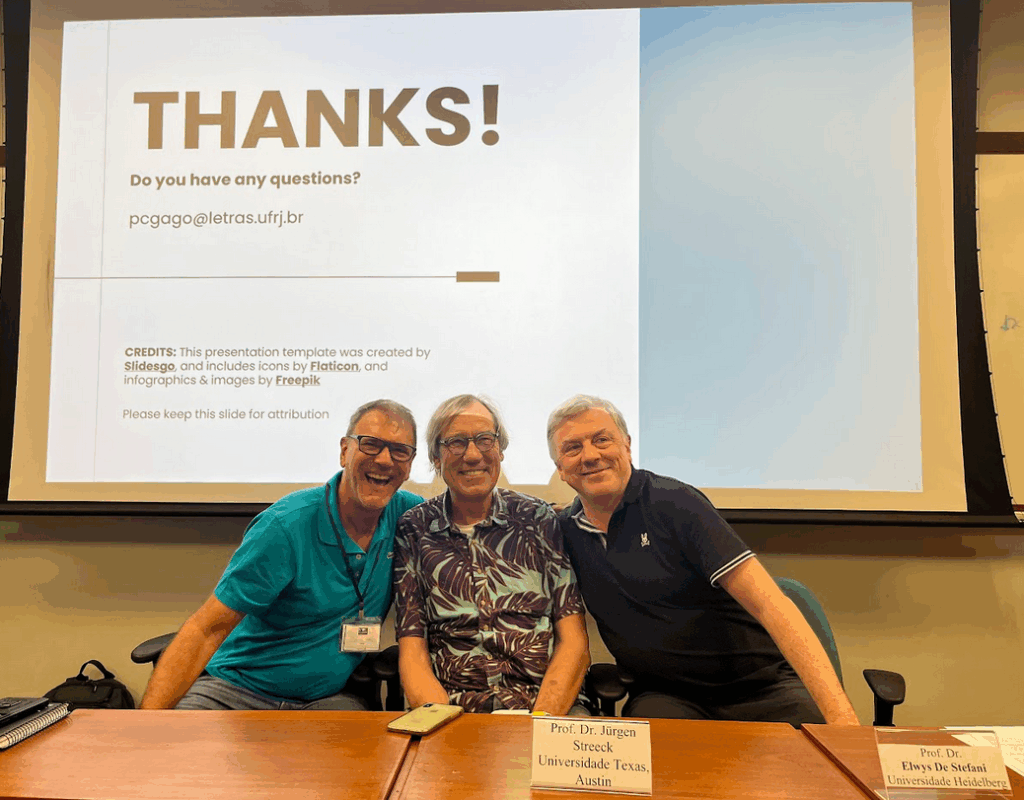Thiago Henrique Carvalho, Federal University of Minas Gerais, Brazil
The V Meeting of Ethnomethodological Conversation Analysis (V EnACE): Revisiting paradigms, tools and methodologies took place from March 17 to 21, 2025 at the Federal University of Minas Gerais, in Belo Horizonte, Brazil, in partnership with the Federal University of Espírito Santo (UFES), the Federal University of Lavras (UFLA), and the University of Brasília (UnB). The conference was organised by committee president Professor Ulrike Schröder with Professor Fernanda Cruz as co-organiser .

The goal of the V EnaCE was to revisit paradigms, tools and methodologies in EMCA. The conference featured 52 paper presentations, 3 data session analysis, 1 round table and 1 debate, distributed over two days (March 20-21).
Pre-conference workshops happened on March 17-18 and the conference opening on March 19. The high number of contributions made the participants optimistic about the maintenance and growth of the EMCA community in Brazil, as the event welcomed participants from South and North America, and Europe.
Pre-Conference Workshops
The conference began with free pre-conference workshops on March 17 and 18 that offered researchers great opportunities to develop hands-on knowledge. The workshops focused on different approaches to transcription/preparing data for analysis:
- Optical FlowAnalyzer: A tool to measure screen movement (gestures) – by Adriano Barbosa e Hani Yehia (UFMG);
- Transcribing with EXMARaLDA, GAT 2 and automatic transcription with AI, by Thiago Nascimento (UFLA), Flavia Fidelis (UFMG) e Maria José D’Alessandro (UFMG);
- Annotation and systematic analysis of co-verbal gestures in interactions, by Anna Ladilova (University of Giessen, Germany)
- Transcribing prosody in talk-in interaction, by Verónica González Temer (Metropolitan University of Educational Sciences, Chile)
Conference Unroll
The conference opening was an inspiring and thought-provoking keynote by Jürgen Streeck (UT Austin) titled “Let’s get physical: The body demands to speak”, in which he discussed the importance of gestures and the whole body as an autonomous way to comprehend human interaction. Professor Streeck stressed the importance of following established CA methods with an open mind to consult findings and methods from other research fields, as research on the body and in interaction can thrive even more through interdisciplinarity.

Professor Jürgen Streeck delivering the opening keynote lecture.
The first day of the conference was marked by diverse, concurrent presentations. Participants presented work on conversation in legal contexts, classroom interactions, and the role of multimodal traits in online video-mediated interactions (e.g talking heads). After the morning parallel sessions, the Round Table: Emerging methodological questions and tools for the current research landscape – composed of: Professor Verónica González Temer (Metropolitan University of Educational Sciences, Chile), Professor Roberto Perobelli (UFES), Professor Ulrike Schröder (UFMG) – was featured.The discussants discussed challenges and possibilities for current research on Conversation Analysis, with emphasis on the topic of video-mediated interactions and its methodological traits.

Roundtable composed of Professor Roberto Perobelli, Professor Verónica González Temer and Professor Ulrike Agathe Schröder.
The second day followed the first on its diverse nature of paper presentations covering topics such as interactions about gender and LGBTQIAP+, interactions with doctors in medical contexts, and interactions between politicians. Between the morning and afternoon presentations, the Debate Conversation Analysis at the crossroads, led by Professor Paulo Gago, Professor Jürgen Streeck and Professor Elwys De Stefani was mediated by Professor Thiago Nascimento. Researchers presented brilliant insights about methodological innovations in the field and the interface of CA and technology, especially with the pervasive presence of Artificial Intelligence in everyday interactions and academia.

From left to right: Professor Paulo Gago, Professor Jürgen Streeck and Professor Elwys De Stefani.
Conference Closing and Directions
The conference closing featured the talk Conversation Analysis in Brazil: a temporal synthesis and future questions in which Ana Cristina Ostermann brilliantly traced chronologically how Conversation Analysis was brought to Brazil. She discussed current trends and possibilities for strengthening the field with future collaborations between institutions and researchers, as it is an expanding interdisciplinary area.

Professor Ana Cristina Ostermann during the conference closing.
Ana also made a tribute to Emanuel Schegloff, who unfortunately passed away last year, showing a video of him, stirring up emotions in the participants as they remembered and reflected on his legacy and the ongoing influences of his work. His message and the feelings transmitted by him ended the conference with a flourish. As a result of the conference’s success and the strengthening network of researchers in CA and Interactional Linguistics researchers in the Brazilian community, the next conference will be held in 2028 at Federal University of Goiás.
As a young researcher and member of the organising committee, I have to thank my partners in this journey. The process of organizing such an important event for the EMCA community is a big responsibility and can be really tiring, but the results of more than a year of continuous work have been priceless.

Organising Committee of the V EnACE. From left to right: Maria José D’Alessandro, Roberto Perobelli, Ulrike Schröder, Thiago Carvalho, Thiago Nascimento, Sineide Gonçalves, Fernanda Roque, Flavia Fidelis
The teamwork put into this event was successful in strengthening the already well-established field of EMCA in Brazil. I think that I can speak on behalf of the organising committee and affirm that the upcoming events held by other institutions will be even more fruitful.
